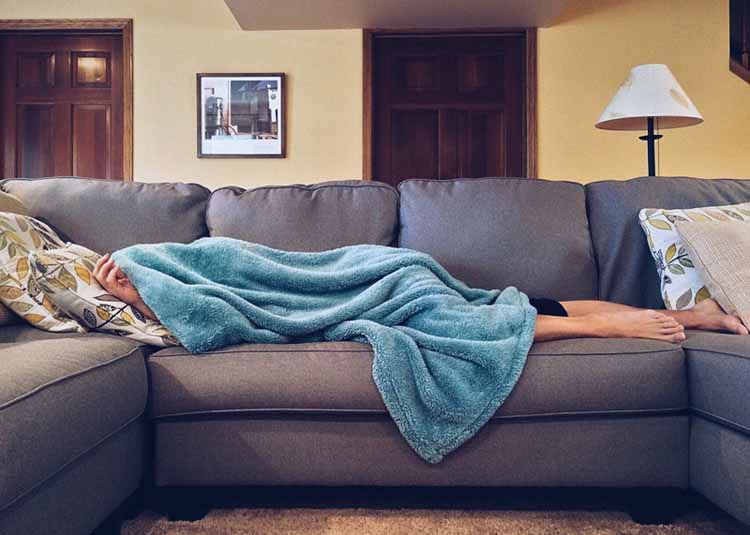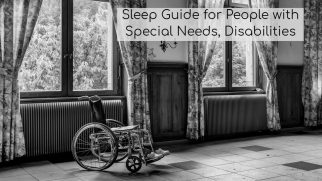Is Sleeping on the Couch Good for Your Health?
by | Last UpdatedWe’ve all ended up snoozing on the couch in front of the TV at least once. Or went to a friend’s place and were suggested to stay overnight in the living room.
Plainly speaking, sleeping on the couch is common.
But is it healthy?
Well, not really, to be honest.
Keep reading to learn more about how regular sleeping on the couch may affect your health and how to make this piece of furniture more comfortable for occasional snoozing.

#1 Too Little Space to Get Comfortable
That’s the first downside to sleeping on the couch.
Yes, your couch may be incredibly comfy to sit on, but here’s something you might not have noticed:
Most couches are short and cannot properly accommodate an average adult.
Of course, we’re not talking about those huge transformer sofas that occupy half of the living room. But if you choose an average couch, chances are that you won’t be able to stretch your legs comfortably.
Along with being short, couches also are pretty narrow when it comes to sleeping on them. They may be even narrower than a Twin mattress, which is considered the bare minimum for a single person to feel comfortable.
With that being said, sleeping on the couch might turn into a real challenge, especially if your height and weight go beyond the average. This will lead to more tossing and turning, overall poor sleep, and the feeling of tiredness the next day.
So, if you often stay up late watching your favorite shows, try to make it to your bed later on.
#2 Little to No Spine Support
Now, let me ask you something:
What piece of furniture appears in your mind when you hear the word ‘couch’?
To me, it’s something with overstuffed segmented cushions that are tufted with buttons or quilted with intricate patterns.
And I cannot say that this type of surface pairs well with proper spine support, even though it may look pretty.
Along with that, most of the couches I’ve slept on are either too soft or incredibly hard. The former could be comfortable for sitting but will likely make you sink deep and restrict your motion if you try to lie down. The latter, on the other hand, may contribute to pain and stiffness because of spine misalignment even if you’ve never felt that before.
Moreover, back pain from sleeping on the couch may kick in as a result of improper positioning. By curling your spine too much — so that you fit in the small space — you can strain the deep muscles and make them stiff.
So, if you have some pain issues or might be prone to them, I’d definitely recommend you choose a regular bed over the couch.
#3 Neck Strains and Shoulder Pain
Along with making your back hurt, sleeping on the couch can take a toll on your neck. And the reason for that is armrests.
They are designed to support your arms, and not your neck. And when you place a pillow over the armrest, things can get even worse because this will result in a nearly right angle between your neck and your body.
Even writing about this feels pretty painful to me.
Of course, you might own a couch with soft and cushiony armrests, but trust me:
They’re still firm enough to overstretch your cervical region. So, when you come back to your regular bed, you might need a pillow for neck pain to relieve the stiffness and get your comfortable sleep back.
Now, you might say: “Ah, the coach is too narrow, so I can just sleep on my side, and the height of the armrest will be enough to support my neck in this position”.
Well, the reality is a bit different here. While the armrest height may indeed be enough for maintaining proper spine alignment, its construction can easily mess with your sleep.
See, an armrest, in most cases, is a plank of solid wood upholstered in cushioning materials. And you might feel the wood core when sleeping on your side, which doesn’t add to the overall comfort. Also, it might pinch the nerves and result in pain and numbness in the shoulder area.
#4 Higher Risks of Allergies and Infections
When we get cozy to watch our  favorite show or a movie, we typically bring snacks and drinks on the couch.
favorite show or a movie, we typically bring snacks and drinks on the couch.
Or, our pets may curl up in the corner for sleeping while we’re at work (even if they’re not allowed to do so).
So, let me ask you a question:
How often do you clean your couch?
Because all these tiny food crumbs, animal hair, dust, and debris may pile up in the corners and junctions for years.
This may not only contribute to funky odors but also make your couch a perfect allergen-friendly spot. And even a single night of sleep might then result in a stuffy nose, red eyes, and troubled breathing if you’re prone to hypersensitivities.
#5 Couch Materials Might Not Help You Sleep Soundly
Finally, sleeping on the couch may not work simply because of its materials. Typically, all sofas and couches are made with durability in mind and consist of heavy-duty materials. Upholstery fabric is one of these materials, and if you take a closer look, you’ll likely notice thick fibers and tight weave. Or, you may own a couch with natural or faux leather upholstery, which is even more long-lasting.
The thing is, these materials might not help you sleep great for a number of reasons:
- They aren’t breathable. Tight weave doesn’t allow your body heat to escape, causing you to sleep hot. With leather upholstery, it’s even more uncomfortable: if you’ve ever sat on a leather couch in shorts on a summer day, you know how displeasing it is to get up.
- They’re harsh. If you have sensitive skin, thick fibers can irritate it and lead to rashes.
- They’re noisy. Leather and leather-like fabrics might look cool, but they also make that annoying sound every time you turn or change position. I personally hate leather couches for this.
Tips for Making Your Couch More Suitable for Occasional Sleeping
Even though you already know that the couch isn’t the best choice for sleeping, sometimes it’s the only option you have.
So, let’s see what you can do to make this piece of furniture more sleep-friendly:
- Use a mattress topper (or a thick blanket). You can purchase a Twin mattress topper made of foam and use it for making your couch surface more uniform and supportive. Or, if you’re staying at a friend’s house, ask for a thick, fluffy blanket and place it under your body for more cushioning.
- Ask for some sheets. A sheet will protect you from dust and debris particles that might hide in the crevices. Also, bedsheets are typically made of breathable fabric with moisture-absorbing properties, so you can expect a cooler sleep as well.
- Clean your couch regularly. If you fall asleep on your couch occasionally, take time to care for it properly. Simple vacuum cleaning once a week will save you a lot of trouble and will prolong the life of your couch.
If your living room — and the budget — allows for that, you can invest in a wider and longer couch that will be more suitable for occasional sleeping. But remember that the best option for your comfort and overall health still is a regular bed.
So, how often do you have to sleep on your couch? Do you experience any stiffness after waking up? Share your experience with us!





No Comments